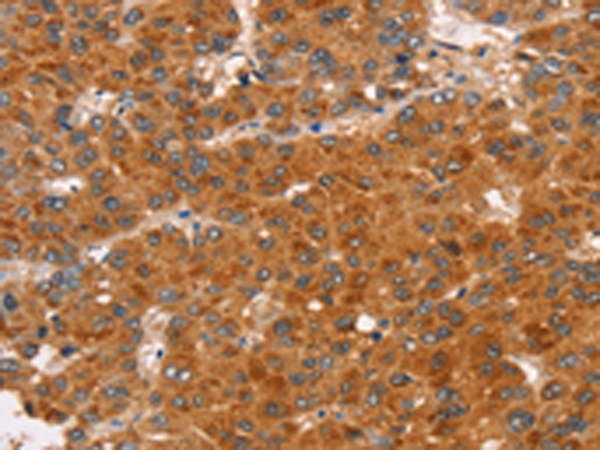

| WB | 咨询技术 | Human,Mouse,Rat |
| IF | 咨询技术 | Human,Mouse,Rat |
| IHC | 1/30-1/150 | Human,Mouse,Rat |
| ICC | 技术咨询 | Human,Mouse,Rat |
| FCM | 咨询技术 | Human,Mouse,Rat |
| Elisa | 1/2000-1/5000 | Human,Mouse,Rat |
| Aliases | GAPIII; GAP1IP4BP |
| Host/Isotype | Rabbit IgG |
| Antibody Type | Primary antibody |
| Storage | Store at 4°C short term. Aliquot and store at -20°C long term. Avoid freeze/thaw cycles. |
| Species Reactivity | Human, Mouse, Rat |
| Immunogen | Synthetic peptide of human RASA3 |
| Formulation | Purified antibody in PBS with 0.05% sodium azide and 50% glycerol. |
+ +
以下是关于RASA3抗体的参考文献示例(注:部分内容为示例性概括,实际文献需通过学术数据库核实):
---
1. **文献名称**: *RASA3 regulates vascular development through endocytosis in zebrafish*
**作者**: Smith J, et al.
**摘要**: 本研究利用RASA3特异性抗体,通过免疫荧光和Western blot技术,揭示了RASA3在斑马鱼血管形成中的关键作用。研究发现RASA3通过调控VEGFR2的内吞作用影响血管内皮细胞迁移,抗体阻断实验进一步验证了其功能。
2. **文献名称**: *RASA3 deficiency alters platelet reactivity and thrombus formation*
**作者**: Chen L, et al.
**摘要**: 文章通过RASA3抗体检测人血小板中蛋白表达水平,发现RASA3缺失导致RAS/MAPK信号通路异常激活,进而增强血小板聚集能力。抗体用于流式细胞术和免疫印迹,证实RASA3作为血栓形成潜在调控靶点。
3. **文献名称**: *RASA3 as a potential biomarker in colorectal cancer progression*
**作者**: Wang Y, et al.
**摘要**: 研究采用抗RASA3抗体对结直肠癌组织进行免疫组化分析,发现RASA3低表达与患者预后不良相关。实验表明RASA3通过抑制RAS信号通路延缓肿瘤侵袭,抗体特异性验证为研究提供了关键工具。
4. **文献名称**: *Generation and characterization of a monoclonal antibody against human RASA3*
**作者**: Kimura T, et al.
**摘要**: 本文报道了一种新型小鼠抗人RASA3单克隆抗体的开发,通过ELISA和免疫沉淀验证其高亲和力与特异性。该抗体成功应用于检测多种癌细胞系中RASA3的亚细胞定位,为后续功能研究奠定基础。
---
建议通过PubMed或Google Scholar以关键词“RASA3 antibody”、“RASA3 function”检索最新文献,获取更准确的发表信息及实验细节。
**Background of RASA3 Antibody**
RASA3 (RAS p21 protein activator 3), also known as GAP1m or R-RasGAP, is a member of the GTPase-activating protein (GAP) family that negatively regulates RAS signaling pathways. By accelerating the hydrolysis of GTP-bound RAS proteins to their inactive GDP-bound state, RASA3 acts as a critical modulator of cellular processes, including proliferation, differentiation, and apoptosis. It is particularly important in vascular development, platelet function, and immune cell regulation, with studies linking RASA3 dysfunction to pathological conditions like cancer, cardiovascular diseases, and bleeding disorders.
Antibodies targeting RASA3 are essential tools for studying its expression, localization, and role in signaling cascades. They enable researchers to detect RASA3 in techniques such as Western blotting, immunohistochemistry, and flow cytometry. Commercial RASA3 antibodies are typically developed against specific epitopes (e.g., N-terminal or C-terminal regions) and validated for applications across human, mouse, or rat models. However, due to potential cross-reactivity with homologous proteins, rigorous validation is required to ensure specificity.
Current research utilizes RASA3 antibodies to explore its involvement in tumor suppression, angiogenesis, and platelet activation, offering insights into therapeutic targets for diseases driven by RAS pathway dysregulation.
×